2024年中考英语时态精讲课件(共29张PPT)
文档属性
| 名称 | 2024年中考英语时态精讲课件(共29张PPT) |  | |
| 格式 | pptx | ||
| 文件大小 | 4.4MB | ||
| 资源类型 | 教案 | ||
| 版本资源 | 通用版 | ||
| 科目 | 英语 | ||
| 更新时间 | 2024-05-08 14:59:38 | ||
图片预览


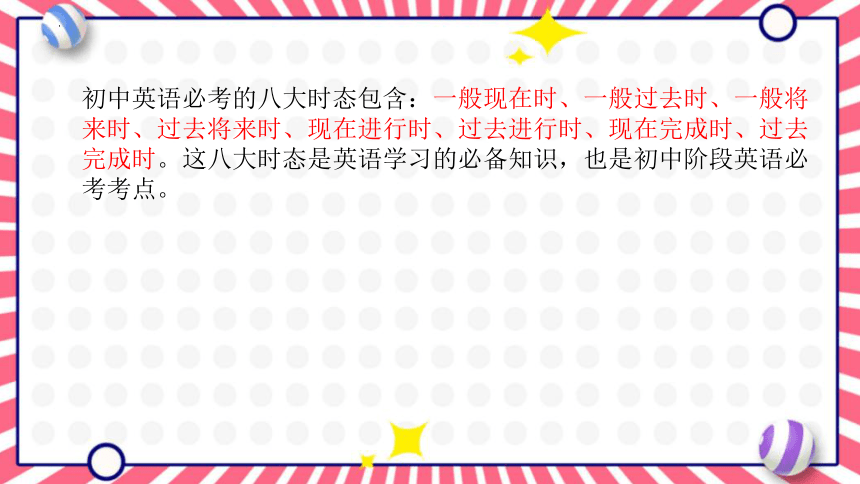
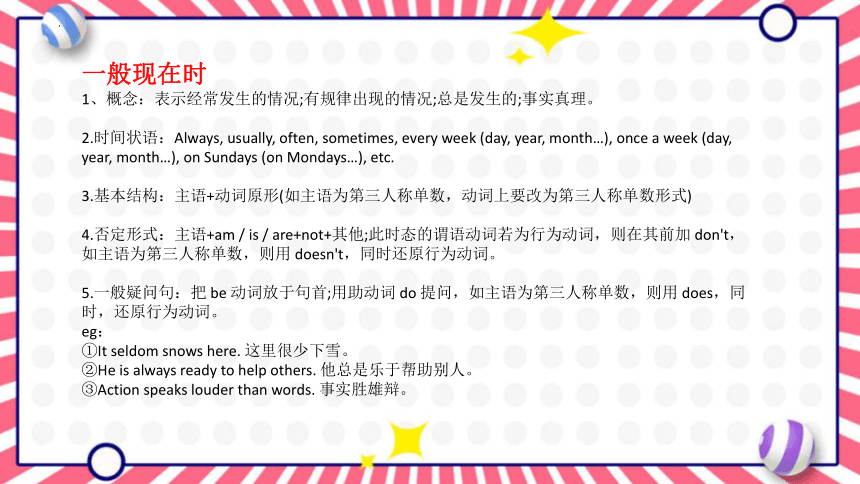

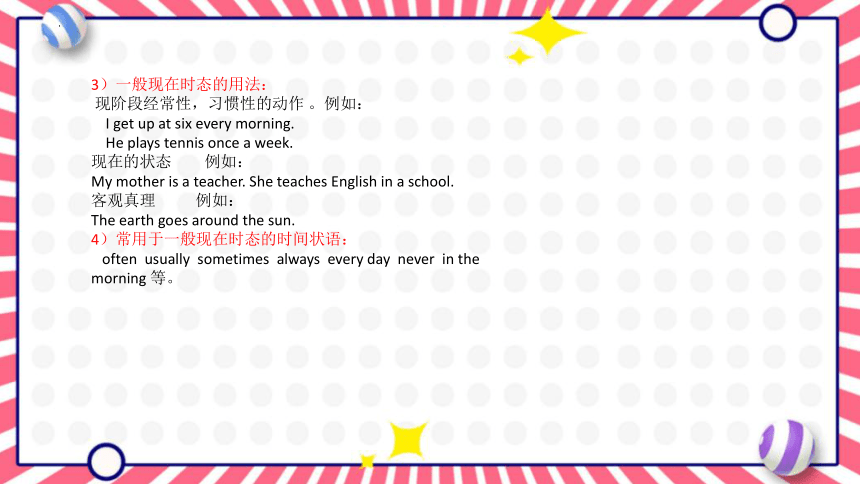

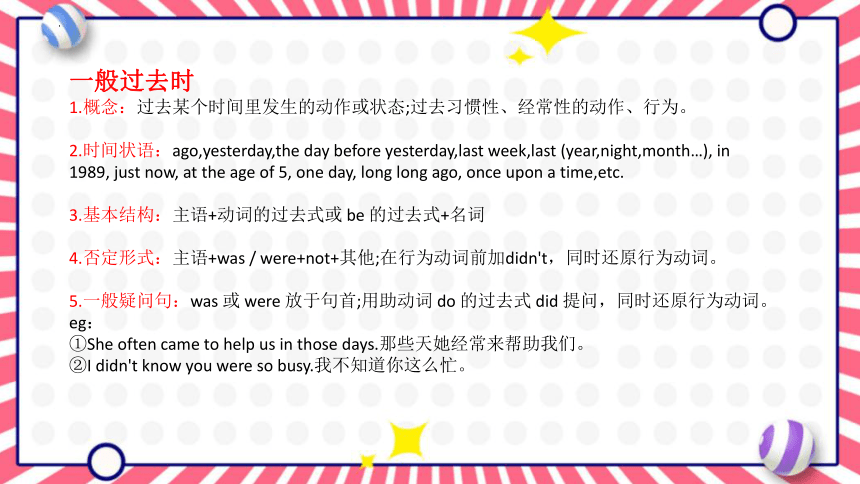
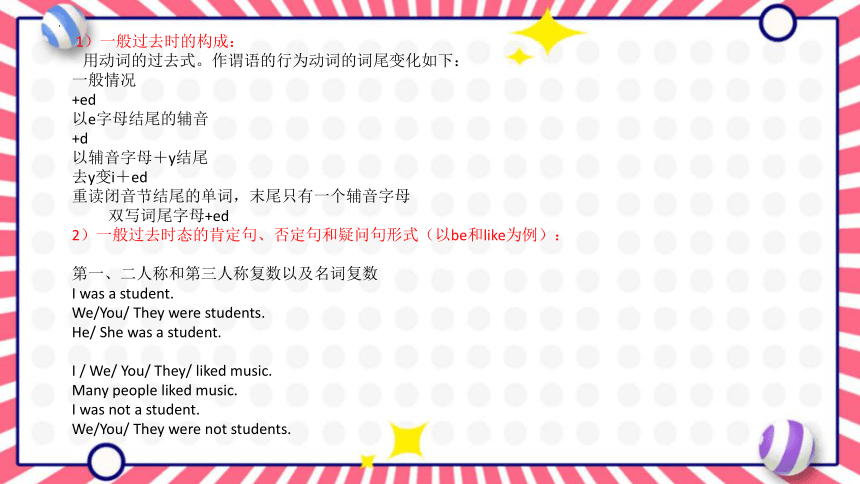
文档简介
(共29张PPT)
中考英语时态精讲
知识分析
1
初中英语必考的八大时态包含:一般现在时、一般过去时、一般将来时、过去将来时、现在进行时、过去进行时、现在完成时、过去完成时。这八大时态是英语学习的必备知识,也是初中阶段英语必考考点。
一般现在时
1、概念:表示经常发生的情况;有规律出现的情况;总是发生的;事实真理。
2.时间状语:Always, usually, often, sometimes, every week (day, year, month…), once a week (day, year, month…), on Sundays (on Mondays…), etc.
3.基本结构:主语+动词原形(如主语为第三人称单数,动词上要改为第三人称单数形式)
4.否定形式:主语+am / is / are+not+其他;此时态的谓语动词若为行为动词,则在其前加 don't,如主语为第三人称单数,则用 doesn't,同时还原行为动词。
5.一般疑问句:把 be 动词放于句首;用助动词 do 提问,如主语为第三人称单数,则用 does,同时,还原行为动词。
eg:
①It seldom snows here. 这里很少下雪。
②He is always ready to help others. 他总是乐于帮助别人。
③Action speaks louder than words. 事实胜雄辩。
1)一般现在时态的构成:主语是I, we, you, they和名词复数时作谓语的行为动词用原形。主语是he, she , it和名词单数时,作谓语的行为动词的词尾变化如下:
一般情况
+s
以s, x, ch, sh 或 o结尾
+es
以辅音+y结尾
去y变i+es
2)一般现在时态的肯定句、否定句和疑问句形式(以be和like为例):
第一、二人称和第三人称复数以及名词复数
I am a student.
We/You/ They are students.
He/ She is a student.
I / We/ You/ They/ like music.
Many people like music.
I am not a student.
3)一般现在时态的用法:
现阶段经常性,习惯性的动作 。例如:
I get up at six every morning.
He plays tennis once a week.
现在的状态 例如:
My mother is a teacher. She teaches English in a school.
客观真理 例如:
The earth goes around the sun.
4)常用于一般现在时态的时间状语:
often usually sometimes always every day never in the morning 等。
例题解析:举一反三,学的更轻松!
1. --- May I help you, sir
--- Yes, I bought the TV the day before yesterday, but it ______.
A. didn’t work B. doesn’t work C. won’t work D. can’t work
解析:电视虽然是前天买的, 但坏了是现在的状态, 应该用一般现在时态。选B.
2.______ the bus until it ______..
A. Get off, stops B. Get off, will stop C. Don’t get off, stops D. Don’t get off, will stop
解析:这是一个以until引导的时间状语从句,主句是祈使句,因此从句要用一般现在时表示将要发生的动作。根据句意此题应用not …until(直到……才)句型。应选C。
3.The 70-year-old man ______ exercises in the morning.
A. takes B. are taking C. took D. will take
解析:“这个70岁的老人早晨锻炼。”这里锻炼是一个经常性、习惯性的动作。因此,应选A.
一般过去时
1.概念:过去某个时间里发生的动作或状态;过去习惯性、经常性的动作、行为。
2.时间状语:ago,yesterday,the day before yesterday,last week,last (year,night,month…), in 1989, just now, at the age of 5, one day, long long ago, once upon a time,etc.
3.基本结构:主语+动词的过去式或 be 的过去式+名词
4.否定形式:主语+was / were+not+其他;在行为动词前加didn't,同时还原行为动词。
5.一般疑问句:was 或 were 放于句首;用助动词 do 的过去式 did 提问,同时还原行为动词。
eg:
①She often came to help us in those days.那些天她经常来帮助我们。
②I didn't know you were so busy.我不知道你这么忙。
1)一般过去时的构成:
用动词的过去式。作谓语的行为动词的词尾变化如下:
一般情况
+ed
以e字母结尾的辅音
+d
以辅音字母+y结尾
去y变i+ed
重读闭音节结尾的单词,末尾只有一个辅音字母
双写词尾字母+ed
2)一般过去时态的肯定句、否定句和疑问句形式(以be和like为例):
第一、二人称和第三人称复数以及名词复数
I was a student.
We/You/ They were students.
He/ She was a student.
I / We/ You/ They/ liked music.
Many people liked music.
I was not a student.
We/You/ They were not students.
3)一般过去时的用法:
1. 过去发生的动作。例如:
The police stopped me on my way home last night.
2. 过去存在的状态。例如:
They weren't able to come because they were so busy.
3. 常用于一般过去时的时间状语:
yesterday,three months ago,last year,in 1979,often,always等。
例题解析:举一反三,学的更轻松!
1. Mr. Mott is out. But he ______ here a few minutes ago.
A. was B. is C. will be D. would be
解析:时分钟前发生的动作, 应该用一般过去时。 应选 A,
2.---Hi, Tom.
---Hello, Fancy. I ______ you were here.
A.don’t know B.won’t think C. think D. didn’t know
解析:虽然句中没有明确的时间状语, 但是可以通过上下文语境判断出, 这句话指的是我这段时间并不知道, 你前一阵子在这儿。 所以应选A。
3.He promised to tell me by himself when I ______.
A. come B. would come C. come D. had come
解析:在时间状语从句中,用一般过去时表示过去将来。应选C。
一般将来时
1.概念:表示将要发生的动作或存在的状态及打算、计划或准备做某事。
2.时间状语:Tomorrow, next day (week,month, year…), soon, in a few minutes, by…, the day after tomorrow,etc.
3.基本结构:主语+am/is / are+going to+do+其它;主语+will / shall+do+其它
4.否定形式:主语+am /is/ are not going to+do;主语+will / shall not do+其它
5.一般疑问句:be 放于句首;will / shall 提到句首。(首字母大写)
eg:
①They are going to have a competition with us in studies.他们将在学习中与我们竞争。
②It is going to rain.天要下雨了。
例题解析:举一反三,学的更轻松!
1. I______ for Hong Kong on Saturday. Will you go to see me off at the airport?
A. am leaving B. am left C. am going to leaving D. left
解析:趋向动词leave 可用现在进行时表将来。选A。
2.I______ to see grandma and help her with some housework every week.
A. came B. am going come C. come D. will come
解析:此题虽然有every week, 但句意中表达的事将要去做的经常性动作。应该用一般将来时。因此选D。
3. We Chinese ______ the Olympic Games in 2008.
A. held B. shall holding C. are holding D. are going to hold
解析:本题的时间状语是将来的时间, 所以选用一般将来时,A、D都删去。shall后面应跟动词原型,
故应选D.
一般过去将来时
1.概念:立足于过去某一时刻,从过去看将来,常用于宾语从句中。
2.时间状语:The next day (morning, year…), the following month (week…), etc.
3.基本结构:主语+was / were+going to+do+其它;主语+would / should+do+其它
4.否定形式:主语+was / were+not+going to+do+其它;主语+would/should+not+do.
5.一般疑问句:was 或 were 放于句首;would / should 提到句首
eg:
①He said he would go to Beijing the next day. 他说他第二天要去北京。
②I asked who was going there. 我问,谁要去那里。
现在进行时
1.概念:表示现阶段或说话时正在进行的动作及行为。
2.时间状语:Now, at this time, days, look, listen, etc.
3.基本结构:主语+be+doing+其它
4.否定形式:主语+be+not+doing+其它
5.一般疑问句:把be动词放于句首。
eg:
①Are you feeling good today 你今天感觉如何
②He is doing well in his lessons.在课上他表现得很好。
例题解析:举一反三,学的更轻松!
Daddy promised me he ______ me a computer
A. was bought B. had bought C bought D. would buy
解析:“爸爸答应我给我买一台电脑”。宾语从句中的动作是以过去为起点将要发生的动作,应用过去将来时。
选D。
They said they ______ do some sports if it was fine.
A. were going to B. went C. would going D. were going
解析:“他们说如果天气好的话他们打算去运动。”去做运动发生在说话之后,所以应选用过去将来时,答案B不合适,“打算作某事”为“be going to do ”.would 后面应跟动词原形,应选A.
过去进行时
1.概念:表示过去某段时间或某一时刻正在发生或进行的行为或动作。
2.时间状语:at this time yesterday, at that time 或以 when 引导的谓语动词是一般过去时的时间状语等。
3.基本结构:主语+was / were+doing+其它
4.否定形式:主语+was/were+not+doing+其它
5.一般疑问句:把 was 或 were 放于句首。(第一个字母大写)
eg:
①At that time she was working in a company. 那段时间她在一家公司工作。
②When he came in, I was reading a newspaper. 他进来时,我正在读报纸。
现在完成时
1.概念:过去发生或已经完成的动作对现在造成的影响或结果,或从过去已经开始,持续到现在的动作或状态。
2.时间状语:yet, already, just, never, ever, so far, by now, since+时间点,for+时间段,recently, lately, in the past few years,etc.
3.基本结构:主语+have / has+过去分词+其它
4.否定形式:主语+have / has+not+过去分词+其它
5.一般疑问句:have 或 has 放句首。
eg:
①I've written an article. 我已经写了一篇论文。
②The countryside has changed a lot in the past few years. 在过去的几年,农村发生了巨大的变化。
例题解析:举一反三,学的更轻松!
--How long ______ he ______ a fever
--- Ever since last night.
A. have, got B. have , had C. have, caught D. did, have
解析:此句表示从昨晚起持续到现在的状态,应用现在完成时,去掉答案D。因为是段时间, 所以不能用短暂行动词,get和catch 都是短暂行动词。因此选B.
My bowl is empty. Who ______ all my soup
A. drinks B. had drunk C. has drunk D. drank
解析:碗是空的了,这里强调的是所发生的动作造成的结果。 “谁把我的汤都喝了。应选C.
3. I ______ you for a long time. Where ______ you ______
A. Didn’t seen; did, go B. didn’t see; have, gone C. haven’t seen; have, been D. haven’t seen; have gone
解析:for+段时间一般预先在完成时连用。“你去哪儿了?”(在这段时间你不在)应选C。
过去完成时
1.概念:过去发生或者已经完成的动作对现在造成的影响或结果,或从过去已经开始,持续到现在的动作或状态。
2.时间状语:before, by the end of last year (term, month), etc.
3.基本结构:had+done.
4.否定形式:had+not+done.
5.一般疑问句:had 放于句首。
6.用法:
(1)在told, said, knew, heard, thought等动词后的宾语从句中。
eg:
She said (that) she had never been to Paris. 她告诉我她从来没有去过巴黎。
(2)在过去不同时间发生的两个动作中,发生在先,用过去完成时;发生在后,用一般过去时。
eg:
①When the police arrived, the thieves had run away. 警察到达时,小偷们早就跑了。
(3)表示意向的动词,如hope, wish, expect, think, intend, mean,suppose等,用过去完成时表示"原本…,未能…"。
eg:
①We had hoped that you would come, but you didn't. 那时我们希望你能来,但是你没有来。
②I had hardly opened the door when he hit me. 我刚打开门,他就打了我。
(注意:had hardly… when... 刚......就......)
③He had no sooner bought the car than he sold it. 他刚买了这辆车,转眼又卖了。
(注意:had no sooner…than 刚…… 就……)
模拟练习
2
1.I will tell him as soon as he _____ back
A. come B. comes C. will come D. came
2. Mary _____ on shoes when she ____ them.
A. tries…buys B. tries… buies
C. trys… buys D. trys… buies
3. The girl often ______ cold when she ______.
A. cathcs dances B. catches dances
C. catchs dancees D. catches dancee
4. _____ he ____ himself there No, I don't think so.
A. Do enjoy B. Does enjoies
C. Does enjoys D. Does enjoy
5. _____ your teacher ____ from them very often Certainly.
A. Do hear B. Does hear C. Do receive D. receive
6. _____ your mother _____ some cleaning on Sundays
A. Does does B. Do does C. Does do D. Do do
7. _____ Tom _____to work hard to help his family Yes, he _____.
A. Has x does B. Has x doesC. Does has has D. Does have does
8. Which teacher _____ lessons to you every day
A. does gives B. does give C. do give D. gives
9. Smith does not go fishing on weekdays, ____ _____ , he does.
A. does heNo B. does heYes
C. doesn't heNo D. doesn't heYes
10.Mr Black often _____ fishing on Sundays, _____ he
A. goes doesn't B. goes isn'tC. doesn't godoes D. doesn't gois
11.He usually _____ TV on Sunday evening.
A. watch B. watches C. watching D. is watching
12. We'll go to play with snow if it ______ tomorrow.
A. snow B. snows C. will snow D. snowed
13. Neither I nor he ______ French.
A. speak B. doesn't speak C. speaks D. doesn't speak
14. Nobody ______ how to run this machines.
A . know B. have known C. knows D. is knowing
15. The Young Pioneer _____ water for the old man every day.
A. carry B. bring C. takes D. carries
16. Some are ______ in the river and some are ______ games.
A. swimming playing B. swimming plaiing
C. swimming I playing D. swimming plaing
17. Look ! The boy students are _____ football while the girls are _____ .
A. playing dance B. playing dancingC. play dancing D. play dance
18. He _____ to do his lessons at eight every evening.
A. is beginning B. is beginning C. begin D. begins
19. _____ he _____ on well with his friends this term 2
A. Does gets B. Does get C. Is getting D. Is geting
20. Mr Smith _____ short stories, but he ____ a TV play these days.
A. is writingis writing B. is writing writes
C. writes is writing D. writes writes
21. I _____ to the cinema. I ______ there every Sunday.
A. go…go B. am going… go
C. go… am going D. am going…am going
22. Look, they______ a good time, ____ they
A. have…do B. have…don't
C. are having…are D. are having aren't
23. You ______ about the future now, ______ you
A. don't think don't B. aren't thinking aren't
C. don't think do D. aren't thinking are
参考答案:
1—5 BABDB 6—10 CDDBA 11—15 BBCCD 16—20 CBDCC
21-23 BDD
Thanks
中考英语时态精讲
知识分析
1
初中英语必考的八大时态包含:一般现在时、一般过去时、一般将来时、过去将来时、现在进行时、过去进行时、现在完成时、过去完成时。这八大时态是英语学习的必备知识,也是初中阶段英语必考考点。
一般现在时
1、概念:表示经常发生的情况;有规律出现的情况;总是发生的;事实真理。
2.时间状语:Always, usually, often, sometimes, every week (day, year, month…), once a week (day, year, month…), on Sundays (on Mondays…), etc.
3.基本结构:主语+动词原形(如主语为第三人称单数,动词上要改为第三人称单数形式)
4.否定形式:主语+am / is / are+not+其他;此时态的谓语动词若为行为动词,则在其前加 don't,如主语为第三人称单数,则用 doesn't,同时还原行为动词。
5.一般疑问句:把 be 动词放于句首;用助动词 do 提问,如主语为第三人称单数,则用 does,同时,还原行为动词。
eg:
①It seldom snows here. 这里很少下雪。
②He is always ready to help others. 他总是乐于帮助别人。
③Action speaks louder than words. 事实胜雄辩。
1)一般现在时态的构成:主语是I, we, you, they和名词复数时作谓语的行为动词用原形。主语是he, she , it和名词单数时,作谓语的行为动词的词尾变化如下:
一般情况
+s
以s, x, ch, sh 或 o结尾
+es
以辅音+y结尾
去y变i+es
2)一般现在时态的肯定句、否定句和疑问句形式(以be和like为例):
第一、二人称和第三人称复数以及名词复数
I am a student.
We/You/ They are students.
He/ She is a student.
I / We/ You/ They/ like music.
Many people like music.
I am not a student.
3)一般现在时态的用法:
现阶段经常性,习惯性的动作 。例如:
I get up at six every morning.
He plays tennis once a week.
现在的状态 例如:
My mother is a teacher. She teaches English in a school.
客观真理 例如:
The earth goes around the sun.
4)常用于一般现在时态的时间状语:
often usually sometimes always every day never in the morning 等。
例题解析:举一反三,学的更轻松!
1. --- May I help you, sir
--- Yes, I bought the TV the day before yesterday, but it ______.
A. didn’t work B. doesn’t work C. won’t work D. can’t work
解析:电视虽然是前天买的, 但坏了是现在的状态, 应该用一般现在时态。选B.
2.______ the bus until it ______..
A. Get off, stops B. Get off, will stop C. Don’t get off, stops D. Don’t get off, will stop
解析:这是一个以until引导的时间状语从句,主句是祈使句,因此从句要用一般现在时表示将要发生的动作。根据句意此题应用not …until(直到……才)句型。应选C。
3.The 70-year-old man ______ exercises in the morning.
A. takes B. are taking C. took D. will take
解析:“这个70岁的老人早晨锻炼。”这里锻炼是一个经常性、习惯性的动作。因此,应选A.
一般过去时
1.概念:过去某个时间里发生的动作或状态;过去习惯性、经常性的动作、行为。
2.时间状语:ago,yesterday,the day before yesterday,last week,last (year,night,month…), in 1989, just now, at the age of 5, one day, long long ago, once upon a time,etc.
3.基本结构:主语+动词的过去式或 be 的过去式+名词
4.否定形式:主语+was / were+not+其他;在行为动词前加didn't,同时还原行为动词。
5.一般疑问句:was 或 were 放于句首;用助动词 do 的过去式 did 提问,同时还原行为动词。
eg:
①She often came to help us in those days.那些天她经常来帮助我们。
②I didn't know you were so busy.我不知道你这么忙。
1)一般过去时的构成:
用动词的过去式。作谓语的行为动词的词尾变化如下:
一般情况
+ed
以e字母结尾的辅音
+d
以辅音字母+y结尾
去y变i+ed
重读闭音节结尾的单词,末尾只有一个辅音字母
双写词尾字母+ed
2)一般过去时态的肯定句、否定句和疑问句形式(以be和like为例):
第一、二人称和第三人称复数以及名词复数
I was a student.
We/You/ They were students.
He/ She was a student.
I / We/ You/ They/ liked music.
Many people liked music.
I was not a student.
We/You/ They were not students.
3)一般过去时的用法:
1. 过去发生的动作。例如:
The police stopped me on my way home last night.
2. 过去存在的状态。例如:
They weren't able to come because they were so busy.
3. 常用于一般过去时的时间状语:
yesterday,three months ago,last year,in 1979,often,always等。
例题解析:举一反三,学的更轻松!
1. Mr. Mott is out. But he ______ here a few minutes ago.
A. was B. is C. will be D. would be
解析:时分钟前发生的动作, 应该用一般过去时。 应选 A,
2.---Hi, Tom.
---Hello, Fancy. I ______ you were here.
A.don’t know B.won’t think C. think D. didn’t know
解析:虽然句中没有明确的时间状语, 但是可以通过上下文语境判断出, 这句话指的是我这段时间并不知道, 你前一阵子在这儿。 所以应选A。
3.He promised to tell me by himself when I ______.
A. come B. would come C. come D. had come
解析:在时间状语从句中,用一般过去时表示过去将来。应选C。
一般将来时
1.概念:表示将要发生的动作或存在的状态及打算、计划或准备做某事。
2.时间状语:Tomorrow, next day (week,month, year…), soon, in a few minutes, by…, the day after tomorrow,etc.
3.基本结构:主语+am/is / are+going to+do+其它;主语+will / shall+do+其它
4.否定形式:主语+am /is/ are not going to+do;主语+will / shall not do+其它
5.一般疑问句:be 放于句首;will / shall 提到句首。(首字母大写)
eg:
①They are going to have a competition with us in studies.他们将在学习中与我们竞争。
②It is going to rain.天要下雨了。
例题解析:举一反三,学的更轻松!
1. I______ for Hong Kong on Saturday. Will you go to see me off at the airport?
A. am leaving B. am left C. am going to leaving D. left
解析:趋向动词leave 可用现在进行时表将来。选A。
2.I______ to see grandma and help her with some housework every week.
A. came B. am going come C. come D. will come
解析:此题虽然有every week, 但句意中表达的事将要去做的经常性动作。应该用一般将来时。因此选D。
3. We Chinese ______ the Olympic Games in 2008.
A. held B. shall holding C. are holding D. are going to hold
解析:本题的时间状语是将来的时间, 所以选用一般将来时,A、D都删去。shall后面应跟动词原型,
故应选D.
一般过去将来时
1.概念:立足于过去某一时刻,从过去看将来,常用于宾语从句中。
2.时间状语:The next day (morning, year…), the following month (week…), etc.
3.基本结构:主语+was / were+going to+do+其它;主语+would / should+do+其它
4.否定形式:主语+was / were+not+going to+do+其它;主语+would/should+not+do.
5.一般疑问句:was 或 were 放于句首;would / should 提到句首
eg:
①He said he would go to Beijing the next day. 他说他第二天要去北京。
②I asked who was going there. 我问,谁要去那里。
现在进行时
1.概念:表示现阶段或说话时正在进行的动作及行为。
2.时间状语:Now, at this time, days, look, listen, etc.
3.基本结构:主语+be+doing+其它
4.否定形式:主语+be+not+doing+其它
5.一般疑问句:把be动词放于句首。
eg:
①Are you feeling good today 你今天感觉如何
②He is doing well in his lessons.在课上他表现得很好。
例题解析:举一反三,学的更轻松!
Daddy promised me he ______ me a computer
A. was bought B. had bought C bought D. would buy
解析:“爸爸答应我给我买一台电脑”。宾语从句中的动作是以过去为起点将要发生的动作,应用过去将来时。
选D。
They said they ______ do some sports if it was fine.
A. were going to B. went C. would going D. were going
解析:“他们说如果天气好的话他们打算去运动。”去做运动发生在说话之后,所以应选用过去将来时,答案B不合适,“打算作某事”为“be going to do ”.would 后面应跟动词原形,应选A.
过去进行时
1.概念:表示过去某段时间或某一时刻正在发生或进行的行为或动作。
2.时间状语:at this time yesterday, at that time 或以 when 引导的谓语动词是一般过去时的时间状语等。
3.基本结构:主语+was / were+doing+其它
4.否定形式:主语+was/were+not+doing+其它
5.一般疑问句:把 was 或 were 放于句首。(第一个字母大写)
eg:
①At that time she was working in a company. 那段时间她在一家公司工作。
②When he came in, I was reading a newspaper. 他进来时,我正在读报纸。
现在完成时
1.概念:过去发生或已经完成的动作对现在造成的影响或结果,或从过去已经开始,持续到现在的动作或状态。
2.时间状语:yet, already, just, never, ever, so far, by now, since+时间点,for+时间段,recently, lately, in the past few years,etc.
3.基本结构:主语+have / has+过去分词+其它
4.否定形式:主语+have / has+not+过去分词+其它
5.一般疑问句:have 或 has 放句首。
eg:
①I've written an article. 我已经写了一篇论文。
②The countryside has changed a lot in the past few years. 在过去的几年,农村发生了巨大的变化。
例题解析:举一反三,学的更轻松!
--How long ______ he ______ a fever
--- Ever since last night.
A. have, got B. have , had C. have, caught D. did, have
解析:此句表示从昨晚起持续到现在的状态,应用现在完成时,去掉答案D。因为是段时间, 所以不能用短暂行动词,get和catch 都是短暂行动词。因此选B.
My bowl is empty. Who ______ all my soup
A. drinks B. had drunk C. has drunk D. drank
解析:碗是空的了,这里强调的是所发生的动作造成的结果。 “谁把我的汤都喝了。应选C.
3. I ______ you for a long time. Where ______ you ______
A. Didn’t seen; did, go B. didn’t see; have, gone C. haven’t seen; have, been D. haven’t seen; have gone
解析:for+段时间一般预先在完成时连用。“你去哪儿了?”(在这段时间你不在)应选C。
过去完成时
1.概念:过去发生或者已经完成的动作对现在造成的影响或结果,或从过去已经开始,持续到现在的动作或状态。
2.时间状语:before, by the end of last year (term, month), etc.
3.基本结构:had+done.
4.否定形式:had+not+done.
5.一般疑问句:had 放于句首。
6.用法:
(1)在told, said, knew, heard, thought等动词后的宾语从句中。
eg:
She said (that) she had never been to Paris. 她告诉我她从来没有去过巴黎。
(2)在过去不同时间发生的两个动作中,发生在先,用过去完成时;发生在后,用一般过去时。
eg:
①When the police arrived, the thieves had run away. 警察到达时,小偷们早就跑了。
(3)表示意向的动词,如hope, wish, expect, think, intend, mean,suppose等,用过去完成时表示"原本…,未能…"。
eg:
①We had hoped that you would come, but you didn't. 那时我们希望你能来,但是你没有来。
②I had hardly opened the door when he hit me. 我刚打开门,他就打了我。
(注意:had hardly… when... 刚......就......)
③He had no sooner bought the car than he sold it. 他刚买了这辆车,转眼又卖了。
(注意:had no sooner…than 刚…… 就……)
模拟练习
2
1.I will tell him as soon as he _____ back
A. come B. comes C. will come D. came
2. Mary _____ on shoes when she ____ them.
A. tries…buys B. tries… buies
C. trys… buys D. trys… buies
3. The girl often ______ cold when she ______.
A. cathcs dances B. catches dances
C. catchs dancees D. catches dancee
4. _____ he ____ himself there No, I don't think so.
A. Do enjoy B. Does enjoies
C. Does enjoys D. Does enjoy
5. _____ your teacher ____ from them very often Certainly.
A. Do hear B. Does hear C. Do receive D. receive
6. _____ your mother _____ some cleaning on Sundays
A. Does does B. Do does C. Does do D. Do do
7. _____ Tom _____to work hard to help his family Yes, he _____.
A. Has x does B. Has x doesC. Does has has D. Does have does
8. Which teacher _____ lessons to you every day
A. does gives B. does give C. do give D. gives
9. Smith does not go fishing on weekdays, ____ _____ , he does.
A. does heNo B. does heYes
C. doesn't heNo D. doesn't heYes
10.Mr Black often _____ fishing on Sundays, _____ he
A. goes doesn't B. goes isn'tC. doesn't godoes D. doesn't gois
11.He usually _____ TV on Sunday evening.
A. watch B. watches C. watching D. is watching
12. We'll go to play with snow if it ______ tomorrow.
A. snow B. snows C. will snow D. snowed
13. Neither I nor he ______ French.
A. speak B. doesn't speak C. speaks D. doesn't speak
14. Nobody ______ how to run this machines.
A . know B. have known C. knows D. is knowing
15. The Young Pioneer _____ water for the old man every day.
A. carry B. bring C. takes D. carries
16. Some are ______ in the river and some are ______ games.
A. swimming playing B. swimming plaiing
C. swimming I playing D. swimming plaing
17. Look ! The boy students are _____ football while the girls are _____ .
A. playing dance B. playing dancingC. play dancing D. play dance
18. He _____ to do his lessons at eight every evening.
A. is beginning B. is beginning C. begin D. begins
19. _____ he _____ on well with his friends this term 2
A. Does gets B. Does get C. Is getting D. Is geting
20. Mr Smith _____ short stories, but he ____ a TV play these days.
A. is writingis writing B. is writing writes
C. writes is writing D. writes writes
21. I _____ to the cinema. I ______ there every Sunday.
A. go…go B. am going… go
C. go… am going D. am going…am going
22. Look, they______ a good time, ____ they
A. have…do B. have…don't
C. are having…are D. are having aren't
23. You ______ about the future now, ______ you
A. don't think don't B. aren't thinking aren't
C. don't think do D. aren't thinking are
参考答案:
1—5 BABDB 6—10 CDDBA 11—15 BBCCD 16—20 CBDCC
21-23 BDD
Thanks
同课章节目录
- 词法
- 名词
- 动词和动词短语
- 动词语态
- 动词时态
- 助动词和情态动词
- 非谓语动词
- 冠词
- 代词
- 数词和量词
- 形容词副词及其比较等级
- 介词和介词短语
- 连词和感叹词
- 构词法
- 相似、相近词比较
- 句法
- 陈述句
- 一般疑问句和否定疑问句
- 特殊疑问句及选择疑问句
- 反意疑问句
- 存在句(There be句型)
- 宾语从句
- 定语从句
- 状语从句
- 主谓一致问题
- 简单句
- 并列句
- 复合句
- 主谓一致
- 主、表语从句
- 名词性从句
- 直接引语和间接引语
- 虚拟语气
- 感叹句
- 强调句
- 倒装句
- 祈使句
- 句子的成分
- 句子的分类
- 题型专区
- 单项选择部分
- 易错题
- 完形填空
- 阅读理解
- 词汇练习
- 听说训练
- 句型转换
- 补全对话
- 短文改错
- 翻译
- 书面表达
- 任务型阅读
- 语法填空
- 其他资料
